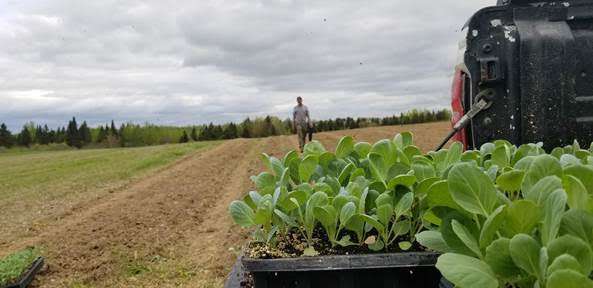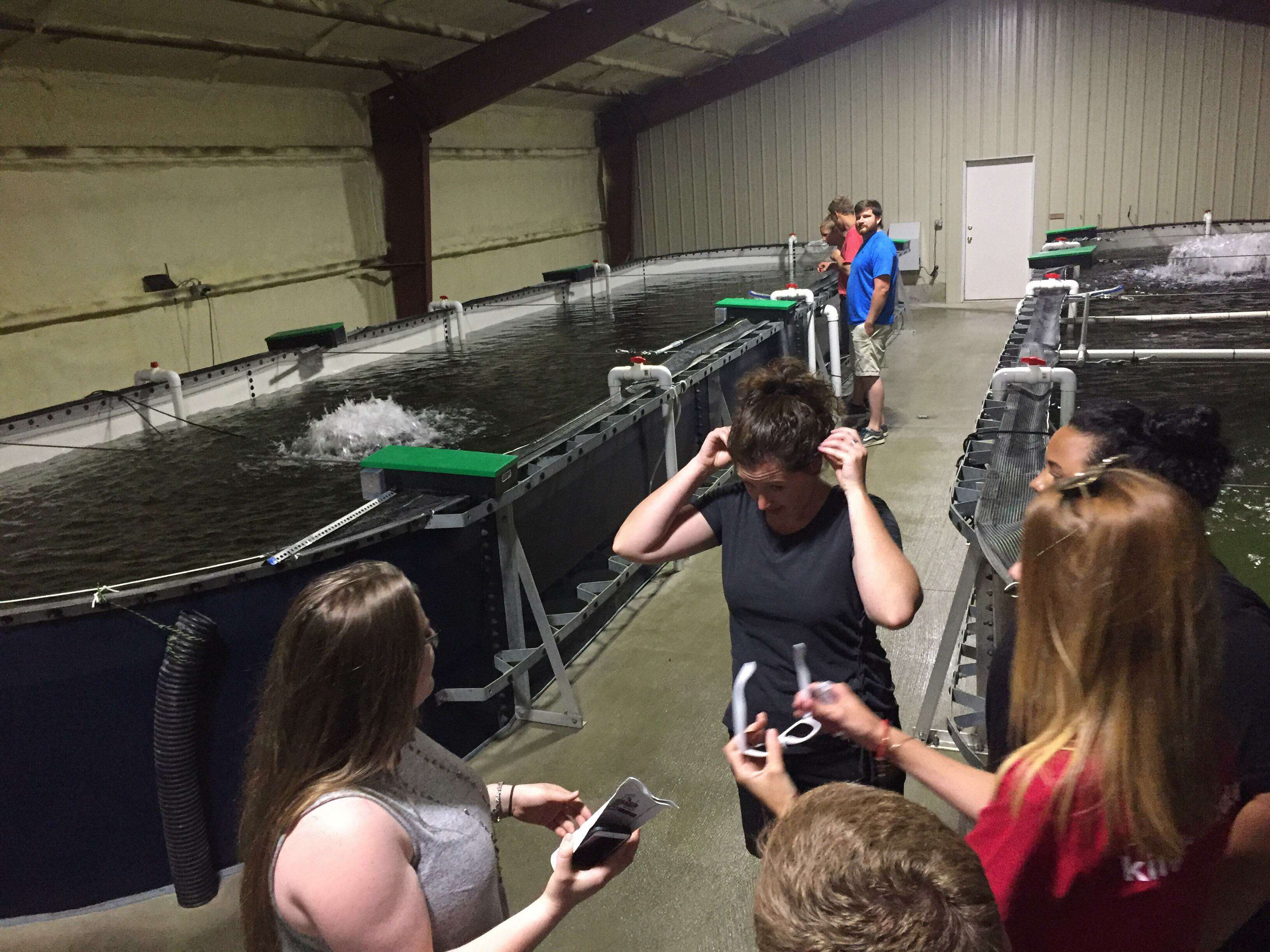
Caribou’s Micmac Farms cultivates entrepreneurs, expands marketing
 Courtesy / The Aroostook Band of Micmacs Archive
Shoppers peruse goods from more than 22 local producers, farmers and artisans at the Micmac Farms Complex during the Spring Festival Market + Seed Swap.
Courtesy / The Aroostook Band of Micmacs Archive
Shoppers peruse goods from more than 22 local producers, farmers and artisans at the Micmac Farms Complex during the Spring Festival Market + Seed Swap.
Micmac Farms, a growing agricultural business in Caribou, is busy this winter with a variety of initiatives to cultivate entrepreneurship and expand market presence.
A 28-acre farm that belongs to the Aroostook Band of Micmacs, Micmac Farms is located at 1353 Presque Isle Road. The operation includes a farm, orchard, store, farmers market and indoor 34,000-gallon aquaculture facility raising Maine brook trout.
Micmac Farms has been working to build awareness of its products among the general public, Jacob Pelkey, the marketing manager, told Mainebiz.
Pelkey was hired two years ago. His position was funded by a grant from the Administration for Native Americans, a program of the U.S. Department of Health and Human Services.
With his hire, the business also launched an online presence via Facebook, Google and Instagram. This winter, a website with an online store is expected to go live, and a road sign will be installed in the spring outside the bricks-and-mortar version.
“Going forward, you may find packaged smoke trout products, caviar or our preserves available as we scale our production up to meet demand,” Pelkey said.
Growing infrastructure
Micmac Farms began as a community garden in 2009. In 2010, a 9,000-square-foot facility was built to include the hatchery, processing space and store.
The new facility was built to create access to wholesome and nutritious foods for the general public as well as the tribal community, he said.
Today, the farm’s output includes in-season produce, fruit from grafted trees, specialty preserves, farm-to-table meals and Maine brook trout for consumers and for pond stocking.

The farm cultivates four acres of perennial orchards, two acres of native pollinator habitat and two acres of seasonal produce.
Its infrastructure also includes 3,360 square feet of greenhouses and 2,700 square feet of retail space, along with the indoor aquaculture facility.
Fresh produce is sold locally through farmers markets, the farm’s store and regional restaurants. The fish is sold through the same outlets plus fresh fish markets in Rockland, Portland and Portsmouth, N.H. In addition, the farm delivers fish statewide for stocking ponds. Native brook trout was chosen for cultivation because of its cultural importance to the Aroostook Band of Micmacs, according to Pelkey.
“We have always depended on its role as an environmental indicator as well to have it sustain us,” he said. “We no longer can go catch enough to sustain us and we have lost access because of fishing limits, fishing seasons, there is environmental mercury in the fish, and the wild populations are not what they once were.
"So to increase our access to the fish and to provide enough for the tribal members we are raising it, and by doing it indoors we can eliminate chemical runoff from nearby agriculture, and lower the mercury level in our fish we can eat more of it.”
The fish has been well received throughout New England, he said. The year-round facility has a 12,000-pound capacity that has already sold out this season. The facility regularly hosts group tours.
“Aquaculture has become the first point of contact for a lot of people,” he said.
Entrepreneurs
Micmac Farms is driven by missions to boost tribal health by creating direct access to good food, put people before profits, use natural methods for cultivation and raise food sustainably, Pelkey said.
Its products are certified “Made/Produced By American Indians.” The farm works with the Intertribal Agricultural Council and American Indian Foods to provide fish for conferences and trade shows. Produce and fish are harvested the morning they're offered for sale.
Micmac Farms also seeks to support entrepreneurship, he said.
“Our community is at the heart of everything we do and it is critically important that we meet our community where it is,” he said. “This means we are active participants in our area farmers markets, participate in large community events like Thursdays on Sweden Street, Trunk or Treat and Native American Heritage Month.”
Farmers markets have played a big role in helping tribal members start small businesses, he said.
“One tribal member is raising micro greens in his house, and he was selling them just by word of mouth,” he said. “Now, he can come to the farmers market and come away with a pretty good pocket full of cash.”
Those successes have in turn inspired others. “It encourages them to take a step toward raising their own food and making it a business as well,” he said.

The farm also provides presentations at Northern Maine Community College and the University of Maine at Presque Isle. In 2019, the farm welcomed 35 tours from school groups, including Bates, Unity and Bowdoin colleges and every K-12 school in Aroostook County.
On Jan. 17, Pelkey gave a presentation about the fish hatchery at the Maine Aquaculture Research, Development and Education Summit in Belfast.
Micmac Farms held its first Festival Market in November 2018, with 17 farms participating. The event generated local enthusiasm, he said. Working with the city of Caribou and the Presque Isle Farmers Market, the Festival Market became a series held every month, October through May, at Micmac Farms, attracting 400 to 600 shoppers.
There’s space for 22 vendors.
“I have a network of 83 farmers, producers and businesses who have been to at least one of our markets,” he said. “The structure of this market is very free, and the barrier to entry is very low. Already I am aware of three businesses that started at these markets and now have e-commerce websites, permanent store fronts, and it is no longer a hobby but their life’s work.”
With the series’ success, Micmac Farms also opened its space for workshops, classes, seminars, conferences and meeting spaces.
Goals to increase production
Marketing initiatives are focusing on areas of growth, such as canned goods. Pelkey said the goal is to scale up production of specialty canned goods to be available in Whole Foods supermarkets and co-ops throughout New England.
Another goal is to increase production of the hatchery, with the eventual addition of a new facility. The fish operation has huge potential for growth for pond stocking, he said.
“We expect that demand to double,” he said.
Expanding the fresh fish market mainly consists of one-on-one conversations with small distributors and markets, “letting them know this is not just another farm-raised rainbow trout coming from Idaho,” he said.

Marketing of fresh goods will probably always stay regional, with direct delivery to restaurants as one of its largest points of entry, he said.
Overall, he said, demand for Native American-made products is trending up. The farm’s canned goods do well at trade shows and in the Country Co-op in Houlton. Among Aroostook County communities, recognition of the Micmac Farms brand is growing, especially in the past couple of years, he added.
“Maybe they’ve read a headline or tried our products,” he said. “When you say it’s raised by an American tribe, with that comes the knowledge that this is raised in a sustainable manner, maybe it’s a heritage crop rather than a GMO variety. We’d like to build off that.”










0 Comments